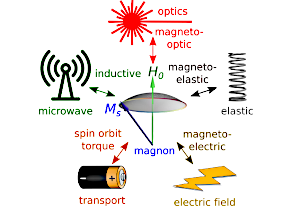
Spin insulatronics covers efforts to generate, detect, control, and utilize high-fidelity pure spin currents and excitations inside magnetic insulators. Here, the authors review recent developments to realize electric and thermal generation, manipulation, detection, and control of pure spin information in insulators.
Ultimately, the new findings may open doors for pure spin-based information and communication technologies. The aim is to replace moving charges with dynamical entities that utilize low-dissipation coherent and incoherent spin excitations in antiferromagnetic and ferromagnetic insulators. The ambition is that the new pure spin-based system will suffer reduced energy losses and operate at high frequencies. In magnetic insulators, there are no mobile charge carriers that can dissipate energy. Integration with conventional electronics is possible via interface exchange interactions and spin–orbit couplings. In this way, the free electrons in the metals couple to the localized spins in the magnetic insulators. In turn, these links facilitate spin-transfer torques and spin–orbit torques across metal–insulator interfaces and the associated phenomena of spin-pumping and charge-pumping. The interface couplings also connect the electron motion inside the metals with the spin fluctuations inside the magnetic insulators. These features imply that the system can enable unprecedented control of correlations resulting from the electron–magnon interactions.
Team: Microwave devices
Contact at SPINTEC: Olivier KLEIN
Available from: HAL 02935125, DOI 10.1016/j.physrep.2020.08.006.
